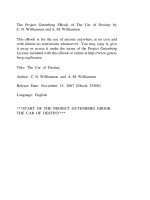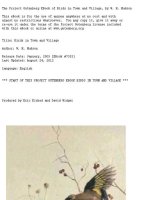The Project Gutenberg eBook, Evolution, by Theodore Graebner pptx
Bạn đang xem bản rút gọn của tài liệu. Xem và tải ngay bản đầy đủ của tài liệu tại đây (765.1 KB, 382 trang )
The Project Gutenberg eBook, Evolution,
by Theodore Graebner
This eBook is for the use of anyone
anywhere at no cost and with almost no
restrictions whatsoever. You may copy it,
give it away or re-use it under the terms of
the Project Gutenberg License included
with this eBook or online at
www.gutenberg.org
Title: Evolution An Investigation and a
Critique
Author: Theodore Graebner
Release Date: September 18, 2006
[eBook #19321]
Language: English
Character set encoding: ISO-646-US (US-
ASCII)
***START OF THE PROJECT
GUTENBERG EBOOK EVOLUTION***
E-text prepared by Kurt A. T. Bodling,
formerly Director of Library Services at
Concordia College, Bronxville, New
York, USA
EVOLUTION.
An Investigation and a Criticism
by
TH. GRAEBNER,
Concordia Seminary, St. Louis, Mo.
Milwaukee, Wis. Northwestern Publishing
House, 1921.
Species tot sunt, quot diversas formas ab
initio produxit Infinitum Ens. Linne.
To the Memory of my teacher (New Ulm,
1892) John Schaller Educator,
Theologian, Student of Science these
chapters are dedicated by The
Author
TABLE OF
CONTENTS.
Chapter 1. An Outline of the Theory…11
Definition—Historical Review—The
Darwinian Hypothesis—Lines of Evidence—
The Descent of Man—The Nebular
Hypothesis—The Origin of Life—The
Bearing of Evolution on Christianity.
Chapter 2. Unexplained Origins…29 The
Origin of the Universe—The Origin of Life—
Biological Barriers— Man.
Chapter 3. The Testimony of the Rocks…47
Chapter 4. The Fixity of Species…62
Chapter 5. Rudimentary Organs…70
Chapter 6. Instinct…74
Chapter 7. Heredity…80
Chapter 8. A Scientific Creed Outworn…87
Chapter 9. Man…94
Chapter 10. The Verdict of History…113
Chapter 11. Evidences of Design…124
Chapter 12. The Fatal Bias…141
PREFATORY.
I first read Charles Darwin's "Origin of
Species" in the library of my sainted
uncle, John Schaller, at New Ulm,
Minnesota, in 1892. I did not comprehend
all of it then, a cause, to me, of
considerable chagrin, for which I later
found some consolation in the opinion of
Dr. Frederick Lynch, who pronounces
Darwin's epochal work "one of the two
most difficult books in the English
language." But like many others, I
understood enough of Darwin's book to
catch glimpses of the grandeur of the
conception which underlies its
argumentation. It was then that my beloved
uncle, out of that wide and accurate
reading which so frequently astonished his
friends, and with that penetrating dialectic
of his, opened my eyes to certain fallacies
in Darwin's argument, especially to the
fatal weakness of the chapter on Instinct.
The reading of St. George Mivart's book
"The Genesis of Species" later convinced
me of the accuracy of my uncle's judgment.
But the fascination of the subject
persisted, and for a time Herbert
Spencer's "Synthetic Philosophy," by the
comprehensiveness of its induction and its
vast array of data, exercised its thrall.
Alfred Russel Wallace's "Darwinism,"
Huxley's "Lectures on Evolution,"
Tyndall's "The Beginning of Things,"
Grant Allen's "The Evolutionist at Large,"
Eimer's "Orthogenesis," Clodd's "Story of
Creation," occupied me in turn, until the
apodictic presentation of John Fiske's
Essays on Darwinism, no less than the
open and haggard opposition to
Christianity which prevails in Huxley's
"Science and Hebrew Tradition" and in
Spencer's chapters on "The Unknowable"
(so the Synthetic Philosophy denominates
God), caused a revulsion of sentiment,—
the anti-religious bias of evolution
standing forth the clearer to my mind, the
longer I occupied myself with the subject.
I determined to investigate for myself the
data on which the speculations whose
mazes I had trod these years were built up.
The leisure hours of three years were
devoted to the study of first-hand sources
of Comparative Religion. The result of
this research was deposited in two
articles contributed to the Theological
Quarterly in 1906 and 1907. I fear that the
forbidding character of the foot-notes
served as an effective deterrent to the
reading of these articles. I have now
given, in several chapters of this little
volume, in popular language the argument
against evolution to be derived from the
study of Religion. The reading of Le
Conte's and Dana's text-books of geology
and various other treatises supplied the
data on palaeontology embodied in the
first chapters of the book. The notable
circulus in concludendo ("begging the
question") of which evolutionists here are
guilty was first pointed out to me by Prof.
Tingelstad of Decorah, Iowa, who was in
1908 taking a course in Evolution at
Chicago University, and who called on me
for discussion of the doctrine as he
received it from "head-quarters."
An an excursus in the subject of Pedagogy,
I have treated in my Seminary lectures the
past years, under the head of natural
sciences, the argument against evolution,
and the outlines of these lectures have
furnished the framework for the present
volume. It is hoped that especially our
young men and women who take courses
at our universities will examine the case
against the fascinating and in some
respects magnificent conception of
evolution as this case is presented in the
following chapters. I realize that they, as
well as intelligent readers generally, may
not meet with confidence the statements of
a theologian on a scientific question, least
of all when he essays to treat such a
question from the standpoint of science.
He is presumed to be at home in theology,
but a stranger in the domain of geology,
astronomy, and biology. It is for the
purpose of obtaining a hearing at all that
these introductory remarks are written.
But the argument must stand on its own
merits. The writer will now retire to the
background. The facts shall speak.
TH. G.
EVOLUTION.
CHAPTER ONE. An Outline of the Theory.
Definition.
Evolution is a name comprehending
certain theories which seek to account for
all operations of nature as carried on
according to fixed laws by means of
forces resident in nature. Prof. J. LeConte
of the University of California defines
evolution as: "Continuous progressive
change according to certain laws and by
means of resident forces." Evolution is a
theory, a philosophy, it is not a science.
The theory is called organic evolution in
its relation to living forms (plant and
animal life), cosmic evolution, inasmuch
as attempts have been made to account by
certain laws and the working of resident
forces for the development of the
universe,—the earth, the sun, and the
starry heavens. Also the development of
society, of religion, morals, politics, art,
and mechanical inventions is accounted
for on the theory that there are forces
which, acting according to certain laws,
have through many changes made human
life and institutions as we see them today.
The doctrine of Evolution briefly stated, is
as follows: That in some infinitely remote
period in the past, how or from whence
science does not affirm, there appeared
matter and force; that within matter and in
association with force there also appeared
a primordial cell, how or from whence no
man knoweth, in which there was a spark
of life; and that from this cell all things
animate have emerged, being controlled
by certain laws variously stated by
various evolutionists; that these laws in
connection with the modifying influences
of environment (surroundings,—soil,
climate, etc.) account for and explain the
various species that have existed in the
past and now exist upon earth, man
included. That there are no gaps in the
process but that there is demonstrable a
steady ascent from lower to higher
(simple to more complex) forms of life,
until man is reached, the acknowledged
highest product of evolution.
The extreme evolutionists hold that all the
power and potency of the universe was
stored up in that primordial cell, and that
all things have been worked out without
any superintending agency other than the
forces resident in matter. Every operation
of God is ruled out, or deemed
unnecessary. This is sometimes called
atheistic evolution.
The theistic evolutionist ("theistic" from
"theism," the belief in a personal God)
makes place for God in the beginning and
all along the line of development, as
overlooking the process, perhaps
reinforcing and to a certain extent
directing the energy, but not interfering
with the fixed law or rule of evolution.
According to theistic evolution, God did
not create plants and animals as separate
species (as related in Genesis 1) but
created matter as a crude form and placed
it under certain laws, by which this matter
was, during untold ages, gradually
evolved into worlds. That out of this
matter, called inorganic, plants came into
existence, from some germ or property
existing in matter. The origin of animal
life is explained in various ways by the
so-called theistic evolutionists. Some hold
that the primordial plant life contained
potentially the lowest and simplest
principles of animal life, and from it the
simplest animal forms were evolved; that
from these latter were evolved forms a
little higher, until, after long ages, all the
gradations were passed through until man,
the highest form, was the result. Others
believe that there is such an essential
difference between plants and animals that
the latter could not have come from the
former, that there must be a new start on
the animal side of life. Therefore they
claim that when the evolutionary
development of matter reached a certain
stage, God appeared on the scene and
endowed certain forms with the principle
of animal life, in its lowest elements.
These lowest forms of animal life then
entered upon a series of evolutionary
growth, each lower form evolving one a
little more complex, each series gaining
the use of and developing organs which
existed essentially in the lower form but
were small, imperfect, and useless,
because not needed. Thus the hand and
arm in man are structurally or essentially
the same as the leg of the brute, the wing
of the bird, the flipper of the whale, and
the fin of the fish; and the endeavor to
adapt itself to the water caused the bird to
develop a fin, as by a similar process the
fore-leg of brutes developed into the
human arm and hand.
For our present consideration, we need
not distinguish between atheistic and
theistic evolution, as the latter is subject
to the fundamental objections urged
against evolution in general, and is, like
atheistic evolution, without a single fact to
support it and in direct contradiction of all
that is known of the laws in operation
now, and as far back as knowledge
penetrates. Moreover, so-called "theistic"
evolution is universally approved by
infidels and skeptics and is used by them
as a favorite means of assault on revealed
Truth.
Historical Review.
While in our own day the names of certain
English and German scientists (Darwin,
Spencer, Huxley, Tyndall, Romanes,
Buechner, Vogt, Haeckel) are inseparably
connected with a history of this
hypothesis, its roots are found far back in
the early ages of Greek philosophy. A
theory of evolutionary development was
first propounded by Greek thinkers living
about 600 years B. C. The human mind is
ever on the search for unifying principles,
principles which account for entire groups
of natural phenomena, and not for isolated
phenomena only. The Greek mind sought a
principle by which to account for the
manifold and diverse forms of life in
nature. Whence do all things come? How
have they come to be what they are?
Questions about the nature of the universe
in which we live have been asked from
the very beginning. The moment the human
mind began to reflect the notion that the
vegetation which covers the earth, the
animals which inhabit it, the rocks and
hills, the mountains and valleys which
constitute its physical features, may have
undergone changes in past time, and that
all the phenomena which constitute the
animal, vegetable and mineral worlds as
they now exist, are but modifications of
other forms which have had their day and
their philosophy, the idea of development
became prominent. The early Greek
philosophers were the first to attempt
answers to these problems. Many of them
held that all things natural sprang from
what they called the original elements—
fire, air, earth, water. Anaximander held
that animals were begotten from the earth
by means of heat and moisture; and that
man was developed from other beings
different in form. Empedocles had a
fantastic theory, viz., that the various parts
of man and animals at first existed
independently, and that these—for
instance, arms, legs, feet, eyes, etc.,
gradually combined—perhaps after the
manner in which automobiles are
assembled; and that these combinations
became capable of existing and even of
propagating and reproducing themselves.
Anaxagoras was of opinion that animals
and plants sprang from the earth by means
of germs carried in the atmosphere which
gave fecundity to the earth. Aristotle held
opinions not very unlike those of our own
day. All of which goes to show that
speculation about the origin of the
universe and the why and wherefore of
living things did not come into existence
with the Darwinian hypothesis and that the
doctrine of descent with modification as
an explanation of all biological
phenomena antedates by over two
thousand years the publication of the
"Origin of Species."
In modern times a theory of development
was first suggested by Goethe in his
"Italienische Reise." Acting under the
same mental urge for seeing diverse forms
under a unifying principle, Goethe looked
for the original form of plant life, the
Urpflanze, the plant which would be at
once simple enough to stand for a type of
all plants and yet susceptible to variation
in so many directions that all plants might
derive from it their origin. Goethe has
also clothed this conception in poetic
form.
The first philosophic statement of the
hypothesis is found in Immanuel Kant's
"Kritik der Urteilskraft," 1790. In
paragraph 80 we find a discussion of the
similarity between so many species of
animals, not only in their bony structure,
but also in the arrangement of their other
parts, a similarity which, says Kant, "casts
a ray of hope," that all forms may be
traced back to original simple forms, to "a
generation from a common ancestor,"
rising from the lowest forms to man,
"according to mechanical laws." Kant
assumes that, for instance, certain aquatic









